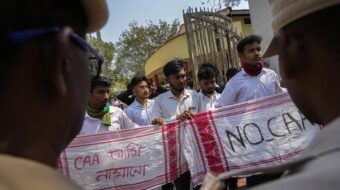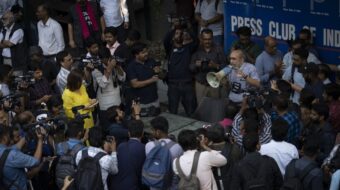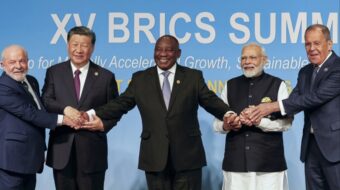PWW Editor Teresa Albano is blogging from India, where she attended the conventions of the Communist Party of India and Communist Party of India (Marxist). The parties hold seats in the national Parliament and lead the governments in three of India’s states.
Nepal:
Historic elections in this impoverished Hindu kingdom will take place this month. The monarchy, which has ruled Nepal for more than 200 years, is expected to be abolished and a parliamentary form of democracy will take its place.
After facing the king’s suspension of rights and a Maoist armed insurgency, Nepal’s political parties have struggled hard for democratic rule. One of the leading parties, the Communist Party of Nepal – United Marxist Leninist, is expected to get the most votes.
One source projected that the Maoists will garner less than 10 percent.
Pakistan:
Democratic forces celebrated the new government’s announcement of the release of some 60 jailed judges and the chief justice.
The elections in Pakistan last month showed the overwhelming opposition to President Pervez Musharraf and the far-right Islamic extremists as a great majority voted for the late Benazir Bhutto’s Pakistan People’s Party and former Prime Minister Nawaz Sharif’s Pakistan Muslim League party. These two parties came in first and second, trouncing both Musharraf’s party and extremist parties.
The demands by the many democratic parties which had boycotted the elections still remain firmly in place. They include full reinstatement of the judiciary and the impeachment of Musharraf. Musharraf had violated the constitution by holding the presidency and at the same time being the chief of the army. It was this that created a political crisis for Musharraf that led him to suspend the judiciary and imprison the chief justice and others.
Representatives of Pakistani democratic and left parties told me they will put friendly pressure on the PPP-led Parliament to implement these demands. The two newly ruling parties, they say, represent feudal and landlord interests, separate from the vast interests of the Pakistan army which rules big sections of the economy and social life. But the democratic parties don’t want to have this new government fall into the hands of Musharraf and army forces — both backed by U.S. imperialism. U.S. military aid to Pakistan is enormous — in the billions. The left parties say U.S. imperialism, Musharraf/army and the extremist Taliban-type forces feed off each other.
The U.S. government portrays an embattled Pakistan ready to fall into the hands of religious extremists as an excuse for supporting the Musharraf dictatorship. At the same time Musharraf does nothing along the border areas to stop these criminal forces, but looks the other way to encourage them as a rationale for U.S. military aid and political support. The extremists and the army attack ordinary Pakistani people and organizations, so the Pakistani people do not support either, the democratic parties say.
Bhutan:
Bhutan’s first general elections on March 24, which will end more than a century of monarchy, evoked an enthusiastic response from voters, with over 30 percent casting their ballots in just two hours.
Voting was peaceful in the land-locked country, reported the Indian newspaper The Hindu.
Bangladesh:
Political rights are suspended by the current military-backed caretaker government.
Opposition parties cannot hold meetings, except inside people’s houses. Calling it ‘indoor politics,’ Communist Party of Bangladesh General Secretary Mujahidul Islam Selim said U.S. government policies that support the Bangladesh military and elite only make matters worse in this South Asian country.
Bangladesh, once part of India, was partitioned into East Pakistan and then won its independence from Pakistan in 1971. Bangladesh is a majority Muslim country with a significant Hindu minority and has close cultural and language ties to the Indian state of West Bengal. Due to the crises in Bangladesh, refugees have been fleeing into neighboring West Bengal, also causing problems for that state.
Sri Lanka:
This war-torn island in the Indian Ocean close to the tip of India faces terrorism and government military attacks. Most recently a government minister was killed by a bombing.
Sri Lanka is a country with a majority Singhalese ethnicity and a significant Tamil ethnic minority. Tamils share language and cultural roots with their Indian Tamil brothers and sisters. Tamils have faced discrimination and oppression in Sri Lanka.
The Liberation Tigers of Tamil Eelam , designated as a terrorist group by the U.S. and European Union, has been waging a war for a separate country, Eelam, for Sri Lankan Tamils. The government has been waging a war against the LTTE but it is affecting the Tamil civilian population. Many have been killed during this violence. A ceasefire signed in 2002 was ended this year as the government withdrew.
A multi-ethnic delegation made up of Singhalese, Tamil and Arab comrades from the Communist Party of Sri Lanka attended the Communist Party of India’s congress in March. A similar delegation, including a government minister, attended the Communist Party of India (Marxist) congress. The CP of Sri Lanka is in favor of a united Sri Lanka with full equality and rights for Tamils and other ethnic or religious minorities.

MOST POPULAR TODAY

Zionist organizations leading campaign to stop ceasefire resolutions in D.C. area


High Court essentially bans demonstrations, freedom of assembly in Deep South

Afghanistan’s socialist years: The promising future killed off by U.S. imperialism

Communist Karol Cariola elected president of Chile’s legislature






Comments